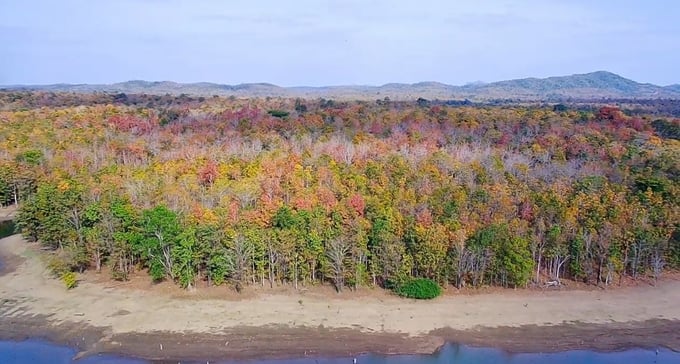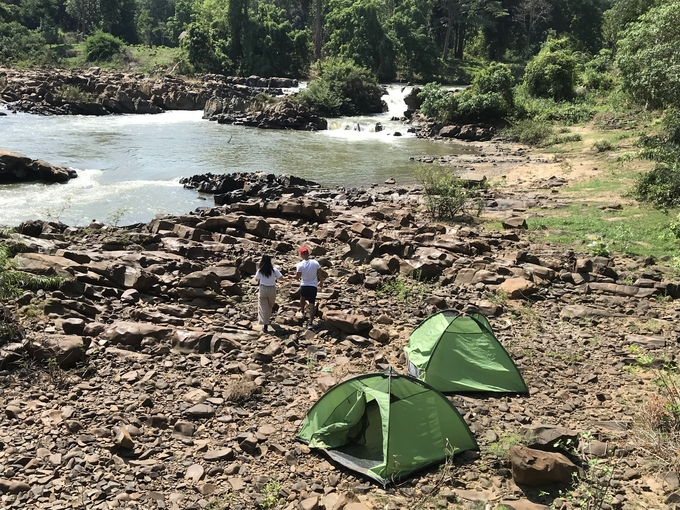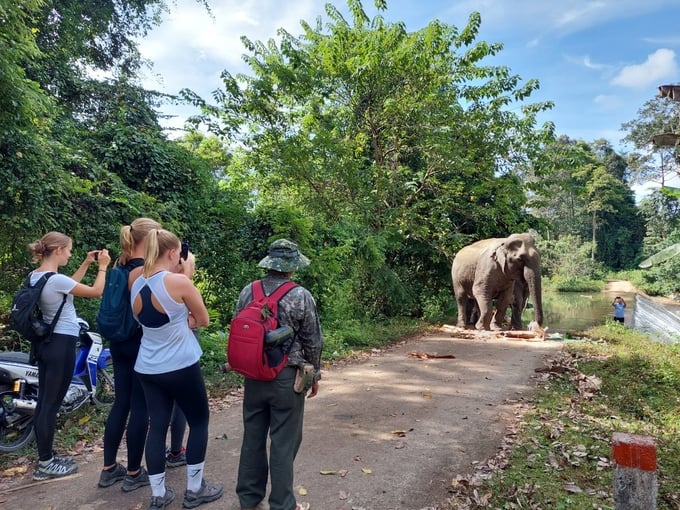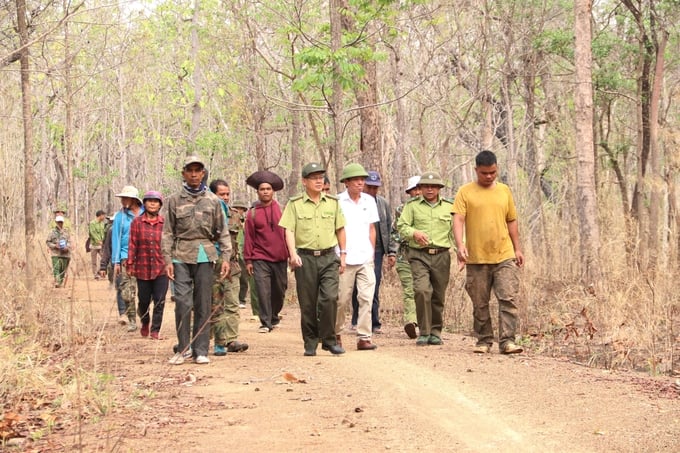May 24, 2025 | 16:20 GMT +7
May 24, 2025 | 16:20 GMT +7
Hotline: 0913.378.918
May 24, 2025 | 16:20 GMT +7
Hotline: 0913.378.918

During the season the dipterocarp forest changes leaves in Yok Don National Park. Photo: Dang Lam.
Yok Don National Park is located in the provinces of Dak Nong and Dak Lak, about 40 kilometers west of Buon Ma Thuot. The park is 115,545 hectares in size, making it the second biggest of its kind in Vietnam.
The site's topography is quite flat, with the Yok Don and Reheng mountains standing prominently. The park's forest is mostly natural, with 96% of it being dipterocarp forest. Yok Don is Vietnam's sole remnant dry dipterocarp forest with temperate forest characteristics.
Yok Don is home to 63 species of mammals, 196 species of birds, 40 species of reptiles, 30 species of amphibians, and 464 kinds of plants, according to surveys, and it has also witnessed the presence of rare animals such as forest elephants, wild buffaloes, and gigantic gaurs.
It is known that there are 56 rare and valuable animal species in Indochina, with Yok Don alone having 38 species, 17 of which have been listed in the global red book, including wild elephant, wild buffalo, ungulates, star deer, phoenix, and precious wood. Since 90% of the forest is primeval forest, an ideal habitat for animals and plants, there is a diversity of animals.

The great Serepok River. Photo: Dang Lam.
Yok Don National Park, Vietnam's unique dipterocarp forest ecosystem, has a high biodiversity with 1,006 plant species, and 650 animal species, including many endemic creatures and plants, endangered and uncommon such as elephants, gaurs, ungulates, and valuable wood species. Yok Don National Park is being examined as a viable location for scientific research, study, and tourism.
Yok Don National Park is also renowned as a cultural tourist destination of the Central Highlands due to the diversified presence of a long-standing indigenous culture of ethnic minorities residing in the buffer zone. This is also the first National Park with a friendly tourist approach that includes both domestic and wild elephants in their natural environment. Every year, it draws a large number of local and foreign visitors.
The Serepok River, the only river with a backward flow in the middle of a horizontal forest, is the spotlight of Yok Don National Park. The river has become an unskippable stop for people visiting Yok Don. The Serepok is an important branch of the Mekong River that runs from Dak Lak province to Dak Nong and subsequently to adjacent provinces in Cambodia.

Tourists' experience with elephants in Yok Don National Park. Photo: Dang Lam.
Serepok, with a length of 406 kilometers, is engulfed in and almost splits the territory of Yok Don National Park in half. Serepok is climbing the rank in travelers' bucket lists as it is blessed with various "hot sites" such as Gia Long Waterfall, Trinh Nu Waterfall, Dray Sap Waterfall, and so on, stretching with breathtaking rapids and yet relatively pristine. Serepok River would satisfy travelers at any time of year due to the distinct qualities of each climatic period, as well as the various and typical vegetation.
Serepok is treasured by Mother Nature not only for its stunning environment but also for the large number of fish of all sizes that gather there, adding to the area's distinctive qualities and biodiversity.
Tourists may also participate in a variety of activities in the Central Highlands, such as visiting elephants, feeding elephants, and playing with elephants beneath the canopy of the dipterocarp forest. They may also come to feast their eyes on beautiful scenery like the Bay Nhanh waterfall. This is also the only location where the Serepok River splits into seven branches that run in separate directions. You can also get a bird's-eye view of the dipterocarp forest by climbing Yok Don, the highest mountain.
The Yok Don National Park Management Board is working to preserve biodiversity, particularly uncommon and valuable creatures. The unit is working with local tourism organizations to establish new tourist concepts, including exploration.

A forest patrol in Yok Don. Photo: Dang Lam.
The region contains seven buffer communes in Dak Lak and Dak Nong, with 12,000 houses and 50,000 inhabitants, according to the Yok Don National Park study. In particular, in the core region of the Park, there are 135 houses with 519 people living in the hamlet of Drang Phok, where agricultural production (farming, rearing cattle, poultry, and small business households) is the major source of income.
According to Nguyen Huu Tao, Deputy Head of Yok Don National Park's Forest Protection Department, the implementation of the contracting policy, as well as protecting forests and supporting communities in the buffer zone, has created jobs, increased incomes, and improved the livelihood of people, particularly ethnic minority households. Contracting for forest protection has improved, and occurrences of Forest Law infractions have reduced compared to the prior time. The contractual community's awareness, knowledge, and responsibility for forest conservation has substantially risen, and individuals in the buffer zone have become aware of the value of forests.
According to Y Zen Byă, a resident of Ea Wer commune in the Buon Don region, his community organization has been contracting for more than 5 years. Since taking on the responsibility of forest conservation, the organization has worked with forest rangers to arrange regular patrols. "People are paid as a result of the contract. We have not been involved in deforestation as before, but have instead engaged in agricultural production since winning the contract. The households participating in the contract are very enthusiastic about patrols as well as forest protection," stated Y Zen.
Translated by Linh Linh

(VAN) The People's Committee of Tra Vinh province has approved an adjustment to the investment policy for the Green Hydrogen Plant project, increasing its area to approximately 52.76 hectares.
![Reducing emissions from rice fields: [2] Farmers’ commitment to the soil](https://t.ex-cdn.com/nongnghiepmoitruong.vn/608w/files/news/2025/05/05/dsc08881jpg-nongnghiep-140632.jpg)
(VAN) Clean rice cultivation model in Thuong Tan commune, Bac Tan Uyen district, is assisting local residents in achieving sustainable agriculture by substantially reducing costs, increasing productivity, and protecting the environment.

(VAN) At the conference to disseminate Resolution No. 68, AgriS introduced its digital agricultural ecosystem and reaffirmed its commitment to accompanying the Government in promoting private sector development and sustainable agriculture.

(VAN) 'Blue Ocean - Blue Foods' initiative is designed to restore marine ecosystems and establish sustainable livelihoods for local communities by cultivating a minimum of 1,000 hectares of cottonii seaweed in the first three years.
/2025/05/21/4642-3-112707_603.jpg)
(VAN) The V-SCOPE project has made direct contributions to three out of six pillars of the Comprehensive Strategic Partnership between Vietnam and Australia.

(VAN) Facing the threat of rabies spreading to the community, Gia Lai province urgently carries out measures to vaccinate dogs and cats on a large scale.

(VAN) Disease-free livestock farming not only protects livestock herds but also stabilizes production and livelihoods for many farmers in Tuyen Quang.